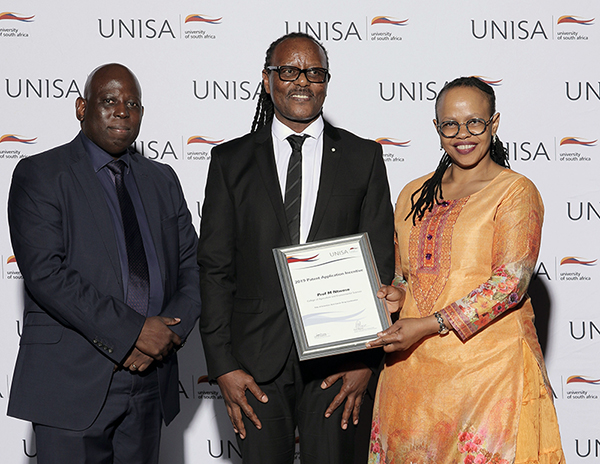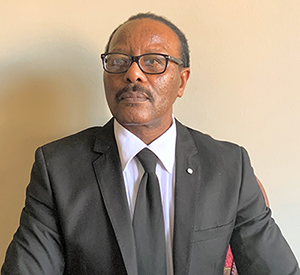
Equipped with state-of-the-art laboratories that provide students with hands-on experiences to bridge theory and practice
Prof Monde Ntwasa from the College of Agriculture and Environmental Sciences (CAES) received a 2019 Innovation Award at the Unisa 2020 Research & Innovation Awards for his 2019 Patent Application Incentive: Anti-cancer drug combination.

Ayanda Noma (Director: Innovation and Technology Transfer) and Prof Thenjiwe Meyiwa (Vice-Principal: Research, Postgraduate Studies, Innovation and Commercialisation) congratulate Prof Monde Ntwasa (CAES) (centre) on his 2019 Patent Application Incentive: Anti-cancer drug combination.
Ntwasa and his team are interested in the mechanisms by which cancer develops (carcinogenesis). They investigate this by using molecular biology and cell biology, as well core biochemistry and genetics. The translation of this knowledge took them to the area of anti-cancer drug development. In this regard, they have a pipeline of drugs under development; this award recognises one drug whose patent is filed.
Ntwasa’s research career started with the study of embryonic development using the common fruit fly, Drosophila, as a model. Elaborating the concept, Ntwasa says that "the fruit fly shares many genetic and physiological properties with humans, making it a very useful model to study human development."
Ntwasa further explains that cancer is a developmental disease as it often arises when defects in developmental mechanisms occur. "While studying normal embryonic development, we discovered molecules that are involved in carcinogenesis. One such molecular is called the retinoblastoma binding protein 6 (RBBP6), which is a regulator of a key tumour suppressor molecule known as p53," he says. "The p53 gene activity is virtually associated with all types of cancer and is mutated in more than half of cancers. We have found that the RBBP6 protein is drugable; thus, it can be targeted by drugs to treat diseases. We then used molecular modelling using computational biology techniques, leading us to the discovery of the drugs we are now developing into anti-cancer drugs."
Asked how he feels about winning the patent application incentive award, Ntwasa says "the filing of the patent is an important step in the discovery process because when it succeeds, many doors will be opened in terms of advancing the development of the drugs and in taking them forward to commercialisation. So, I am encouraged by this incentive as it takes the final aim which is the commercialisation of the proposed drug combination closer to reality. Importantly, it underlines the commitment of the university to promote innovation," he explains.

Prof Monde Ntwasa
Ntwasa explains that his initial interest on the research was to understand how complex organisms such as human beings develop from a single cell to the complex structure seen in the adult human as the systems that underpin such development are similar to those that are altered during carcinogenesis. "Cancer is a very complex disease and new knowledge churned out by researchers has not brought easy solutions; instead, it reveals that cancer may be one of the most complex diseases to cure," Ntwasa explains. He adds further that treatments currently widely used against cancer include surgery and chemotherapy, in which case he is concerned that "surgery is limited in its use because there are some cancers that cannot be removed, while chemotherapy has extremely harsh side-effects."
In addition, Ntwasa says that new therapies currently under development involve hormone therapy and molecular targeting using small molecules. "The latter is our field of interest, where we seek and develop small molecules to target cancers. We are therefore influenced by the need for a cure as well as the challenging and exciting nature of the endeavour," he explains.
Sharing some of his achievements on the research, Ntwasa says: "I personally feel that the most important highlight so far is the discovery that controlling the metabolism of glucose (sugar) could be a key approach in the management of cancer."
Besides this internal recognition for research innovation, Ntwasa is also a recipient of a Capacity Builder Award by the Biotech Fundi Award from the Innovation Hub for training a significant number of PhD and master’s students. His resume also includes hosting three international conferences for the European Molecular Biology Organisation (EMBO). These conferences involved leading international scientists dealing with aspects of drug discovery and development research and were awarded competitively by EMBO. From these prestigious opportunities, Ntwasa has been able to expand his international network.
The South African National Cancer Strategic Framework 2017 to 2022 notes that cancer is a growing national health and socio-economic concern in South Africa. It has been recognised that increasing cancer incidence, high death rate and significant morbidity experienced by cancer survivors are issues that require urgent attention. Through the high calibre of researchers such as Ntwasa, Unisa is committed to building knowledge to solve societal problems through its research output. Ntwasa’s anticancer drug discovery and development research pursues an innovative array in cancer research.
* By Tshimangadzo Mphaphuli, Senior Journalist, Department of Institutional Advancement
Publish date: 2020-04-08 00:00:00.0